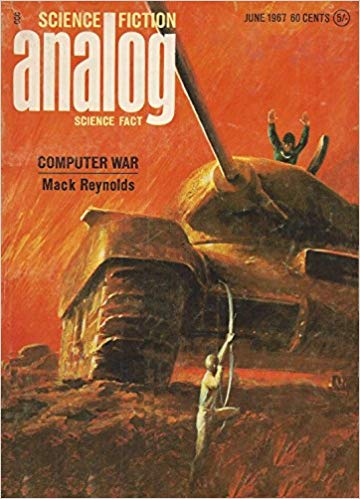Magazine Review: Analog June 1967 edited by John W. Campbell
Let’s take a look at another issue of this venerable science fiction magazine. It’s towards the end of Mr. Campbell’s editorial run (he died in 1971.)

The opening editorial is about interstellar communication, and points out that while we Earthlings have not yet received any communications from other star systems that we know of, it does not follow that there is no one out there, as we don’t know all possible forms of communication.
The cover feature is the first half of “Computer War” by Mack Reynolds. It’s a satirical piece set on a colony planet that has long since lost contact with other worlds. The powerful nation of Alphaland is facing an economic crisis, which could be fixed by conquering its smaller neighbor Betastan, wiping out their industries and making them a dependent colony. Alphaland’s computer projections have assured them of victory. But the projections all rely on a basic assumption that Betastan will fight a conventional war.
In reality, Betastan knows perfectly well it can’t win a conventional war, and has decided to get sneaky instead with guerrilla tactics. Sleeper agents, honey traps, low-tech weapons that don’t set off computer scanners, EMP devices and striking at unexpected targets all contribute to their tactics.
One of the main themes is the danger of relying on centralized computer banks. Slipping misinformation into the propaganda ministry’s data files results in them launching an ill-advised hate campaign against the “bloodthirsty, greedy” Amish. And the Alphaland financial system’s records are all in one centralized location with no off-site backups, so very vulnerable to an electromagnetic pulse. To be honest, it feels like the author is stacking the deck.
Computer War has been published both separately, and as part of “double” books, so should be easily found if you want to know the ending.
“The Double-Edged Rope” by Lloyd Biggle, Jr. is set in an East European dictatorship. Serge, an official in the Bureau of Censorship, has lunch with an outside businessman, Mr. Jones. Mr. Jones points out that sometimes the very specific restrictions on speech handed down by the government tell people more of what’s going on than they conceal. So what is Serge to make of the new law forbidding any discussion of flying saucers? Afterwards, there is another very specific new law.
“Political Science” by Douglas M. Dederer is a fact article about the way political infighting among the various parts of the U.S. government trying to launch a satellite delayed the program until after Sputnik happened. Politics is still stultifying our space program to this day.
“Security Measure” by Joseph P. Martino takes us behind the Iron Curtain again, this time to Russia. An American agent finds himself involved in a counter-counter-revolutionary plot that could result in World War Three…unless the U.S. helps the U.S.S.R. improve their security measures! A sad case of having to betray the relative good guys to help everyone else.
“Project Lion” by Lawrence A. Perkins has humanity about to make first contact with an alien race. But how to ensure that it won’t end in bloodshed? Staff the mission with people too young to have become inflexible in their thinking! A bit of period sexism bleeding through here.
“The Dukes of Desire” by Christopher Anvil is the final fiction piece. It’s set in his “Interstellar Patrol” universe, but the main characters are three merchant marine officers, one of whom has a refurbished Patrol ship. They also have a “want-generator” that they are using to change a backwater planet’s civilization to be less self-destructive. Or at least that’s the plan. Naturally, there are a few obstacles.
The emotion controlling device is skeevy, as is our protagonists’ firm belief that they’re better judges of what’s good for the natives than the natives are. The Patrol ship’s AI is hilarious though.
“Brass Tacks” is the readers’ letter section, lively as always. Best lines: “Power companies don’t want the maximum transfer of power. They want the maximum transfer of profits.”
Last is “The Reference Library”, a selection of reviews of then recent books, including the finale of Samuel R. Delaney’s “The Fall of the Towers” trilogy, which I have myself reviewed.
It’s not the strongest issue, but has a very nice symbolic cover.

